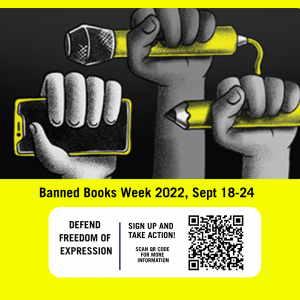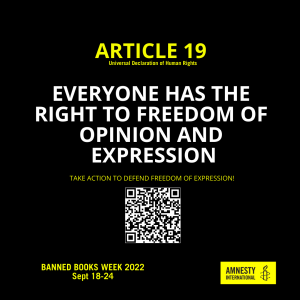
Guest post by Ed McKennon
Library Faculty, Glendale Community College
Amnesty International USA Working Group for Banned Books
Each year in late summer, in preparation for the American Library Association (ALA) Banned Books Week campaign, I take the opportunity to review the Amnesty International Banned Books Week materials which offer a fascinating glimpse into global aspects of censorship and world politics. Typically, the ALA draws attention to currently challenged and banned books in the United States whereas Amnesty International (AI) focuses on global creators who have been sanctioned for their publications. Sanctions often include arbitrary detention or long prison sentences but may also include exile, social and state sponsored harassment, and even the death penalty. Included below is a discussion of this year’s Amnesty International Banned Books Week cases followed by ways that libraries can support the effort.
This year Amnesty International is highlighting two widely distributed English language publications. You Have Not Yet Been Defeated, authored by 2022 featured case Alaa Abdel Fattah, compiles a collection of essays and tweets, including some smuggled out of prison. The book offers insight into 10 years of struggle for democratic reform in Egypt as well as an assessment of how social media technology isn’t living up to its early promise to advance social justice. Fattah is a veteran of the 2011 Egyptian Tahrir Square protest, and has spent 8 of the last 10 years in prison. According to AI, he is “currently serving a five year sentence after being convicted of spurious charges of spreading ‘false news’ over his social media posts.”
Amnesty International is also highlighting a children’s picture book about Loujain al-Hathloul, a 2019 Banned Books Week case. Al-Hathloul is a Saudi woman previously imprisoned because of her advocacy for women’s rights on social media. Loujain Dreams of Sunflowers renders for children a story of hope and dreams amid a culture where the dreams of girls are limited by societal norms and the law. AI has also added coloring pages and other youth materials including bookmarks and information sheets. A 16-year-old journalist from the Occupied Palestinian Territories, who faces ongoing harassment for her reporting, is featured.
The case of Zahra Sedighi-Hamadani, an Iranian LGBTI activist who was arrested while trying to reach Turkey to seek asylum, is indicative of many human rights concerns affecting people across the globe. As a result of her social media posts and an appearance on a BBC program defending LGBTI rights, she was accused of “spreading corruption on earth” including through “promoting homosexuality” and “communication with anti-Islamic Republic media channels.” She has been arbitrarily detained since October 2021 and may face the death penalty if charged. The issues in her case are echoed across the globe. In the United States and elsewhere, asylum seekers continue to face injustice and heightened risk while materials representing LGBTQ persepectives are some of the most controversial materials facing schools and public libraries in the United States. Organized efforts to remove these materials sometimes result in threats, intimidation, public records requests, and criminal accusations.
Those who post on social media continue to put their liberty at risk. In Madagascar, a teacher known for posting about the poor state of school infrastructure, was charged with “defamation and humiliation of members of Parliament and public servants and identity fraud” after he denounced on Facebook the alleged mismanagement and embezzlement of humanitarian aid by several authority figures” after a cyclone.
Luis Manuel Otero Alcántara, a Cuban visual artist, and Maykel Castillo Pérez, a Cuban rapper, have been sentenced to five and nine years in prison respectively for challenging Decree 349, a “dystopian law” that limits the expression of artists. According to Amnesty International, “under the decree, all artists, including collectives, musicians and performers, are prohibited from operating in public or private spaces without prior approval by the Ministry of Culture” and the decree “contains vague and overly broad restrictions on artistic expression. For example, it prohibits audiovisual materials that contain, among other things: ‘use of patriotic symbols that contravene current legislation’ (Article 3a), ‘sexist, vulgar or obscene language’ (Article 3d), and ‘any other (content) that violates the legal provisions that regulate the normal development of our society in cultural matters’ (Article 3g). Furthermore, it makes it an offence to ‘commercialize books with content harmful to ethical and cultural values’ (Article 4f).” These vague and expansive restrictions stifle expression and have resulted in the arrest, detention, and sentencing of many artists and at least six prisoners of conscience named by Amnesty International.
Finally, freelance journalist Vladyslav Yesypenko working for a Crimean branch of Radio Free Europe/Radio Liberty in Ukraine was sentenced to six years in prison after being arrested by the Russian Federal Security Service (FSB) while he was driving on assignment in Crimea.
Each of these individuals continue to risk liberty, expressing themselves with the hope of bettering the communities in which they live. Information professionals around the world can draw inspiration from the words of Zahra Sedighi-Hamadani, LGBTI rights defender and Amnesty International 2022 Banned Books Week focus case. Her quote reminds those of us who live in relatively open countries of the challenges of those who live in unsafe places and the urgency of defending LGBTI expression and human rights in our own communities.
“I want you to know how much pressure we LGBT people endure. We risk our lives for our emotions, but we will find our true selves… I hope the day will come when we can all live in freedom in our country… I am journeying toward freedom now. I hope I’ll arrive safely. If I make it, I will continue to look after LGBT people. I will be standing behind them and raising my voice. If I don’t make it, I will have given my life for this cause.”
Learn more about these cases and take action on their behalf via the Amnesty International Banned Books Week website.

HOW CAN LIBRARIES PARTICIPATE?
Libraries can make a difference by organizing community programs and providing information.
By supporting the Banned Books Week initiatives of both the American Library Association and Amnesty International, libraries can reach out to their communities while further advancing the principles of free expression as articulated in the IFLA Statement on Libraries and Intellectual Freedom and elsewhere.
Libraries and bookstores can get in on the action in an organized fashion by reviewing the “More Actions for Library and Bookstore” section of the online toolkit and exploring ways they can support the effort, connect with the community, and promote freedom of expression.
Augment Book Displays
Ideas in the toolkit include creating a simple “banned books” display that includes info sheets for the Amnesty International cases and links to the ‘take action’ webpages amid a display of books that have a history of censorship.
This year the toolkits on the Banned Books Week website feature QR code enabled printable case sheets that provide basic information about each case and facilitate taking action.
Flyers, bookmarks, and the Buying Books, Amplifying Voices book list (with added titles in 2022) are also available.
Reach out to Local Amnesty International Groups
Libraries and bookstores can reach out to local Amnesty International community and college groups to explore ways to partner. Information about how to find a nearby U.S. based Amnesty International group is in the toolkit. International partners may view Amnesty International country contact information via the Amnesty.org website in order to get in touch with their national section.
Add Case Stories, Words, and Images to Virtual or In-Person Readouts
Organizing a virtual read-out with links to online actions would be an exciting local event if a live in-person read-out is not possible. Local authors, librarians, and booksellers could speak about censorship while Amnesty International members or others from the community share stories of the people featured this year, including the words and images of those censored in the event where possible.
Add and Feature Books Written by Authors Imprisoned or Killed for their Writing
While there are many book lists related to censorship available on the web, libraries and bookstores may be particularly interested in the AIUSA Banned Books Week book list, Buying Books, Amplifying Voices which features more than two dozen books written by or about authors who have been harassed, imprisoned, killed, or exiled because of their writing.
Making these books available to your community takes a stand against censorship. By raising awareness of these creators and their ideas, the intent of censorship is thwarted while our communities gain a greater understanding of the world around us. In the words of Russian LGBTI activist/artist and 2020 Banned Books Week case Yulia Tsvetkova, “the government, ironically, did not silence us, but made it possible to loudly declare injustice.”
Integrate the new Kid-Friendly Resources into Programming and Displays
This year child-friendly resources have been added to the website and include coloring pages related to censorship as well as youth oriented bookmarks and information sheets about current and prior Banned Books Week cases. Loujain Dreams of Sunflowers is the featured children’s book as it tells the story of Loujain al-Hathloul, a 2019 Banned Books Week feature case.
Register for the Live-Online Kick-Off Event
Under the theme Jailed for Words and Art: Uplifting Critical Voices and Fighting Censorship, this event features the voices those challenging censorship, sometimes at significant personal risk. Registration & more details are available (September 15 at 8pm Eastern Time).
Take action throughout October on these Important Cases.
The American Library Association (ALA) has been leading Banned Books Week in the United States since the early 1980s to celebrate the freedom to read and call attention to book censorship efforts. During the 1990s Amnesty International USA began to call attention, during Banned Books Week, to “the plight of individuals who are persecuted because of the writings that they produce, circulate or read.” In 2013, ALA honored Amnesty International USA with an Office of Intellectual Freedom award recognizing AIUSA’s approach to Banned Books Week that focuses on the “logical consequences … that follow when governments are allowed to censor” noting that “beyond the removal or burning of books comes the removal and physical harm to authors, journalists and others.”
Please tell me which states in the USA have book banning laws that include the death sentence.
Thank you for your comment – please note from the context in the article that the reference to capital punishment is to what happens in different countries around the world, rather than, in this case, the US